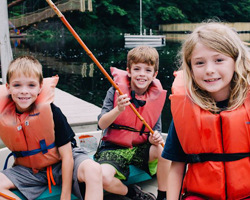It may only be February, but believe it or not, it’s not too early to sign your kids up for summer camp. Many camps fill up quickly, so now’s the time to explore your options, discuss them with your kids, and make some plans.
Begin with your child’s best interest in mind
Many of us live vicariously through our children—and why wouldn’t we? Summertime for kids is all about good times and new experiences to be had, right? But wait. Just because the glossy brochure filled with laughing kids on a rope swing may look like your childhood dream adventure, it doesn’t mean it’s your child’s, too. The good news: Today’s options are designed with a variety of needs and interests in mind. Whether the idea of going to camp is brand-new to your child or you’d like her to consider something different this year, simply begin with some casual conversation to get a feel for what she might enjoy. And remember: Camp is supposed to be fun!
Research your options
Sports camps, academic camps, fine arts camps, adventure camps … even gluten-free camps! There are so many choices it can feel overwhelming. A great place to start is www.westmisummercamps.org, where a comprehensive list of more than twenty-five camps in West Michigan is broken down by category, making it easier to navigate through your options. It can also help to ask the parents of your children’s friends, especially if you think they’ll want a buddy to go with them. Visit the websites of camps that look interesting and make a list to share with your kids. Check out the camps’ social media pages and see what people are saying about them. You can even request literature to be sent in the mail, addressed to your child. After all, kids love to get mail and this will help them get excited and feel like they have a part in the decision process.
Location
Where the camp is located should play a factor in your decision. If your child is a first-time camper, he (and you!) might feel a little better if it’s closer to home. If your child is a seasoned camper, consider venturing a little further away—so it actually feels like “getting away.”
Camp Size
The size of a camp has a big impact on the camp environment and your camper’s experience. Large camps are often split up by age and gender and do activities separately from the others. Smaller camps have a bit more of a cohesive feel, with fewer staff members and so on. Consider your child’s personality and where you think he or she will feel most comfortable.
Camp Culture
Another important consideration is the camp’s focus and values. Do you want a camp that focuses on building certain skill? Do you want children to get more comfortable taking risks? Do you want them to grow their social skills or their spirituality? Reading the “About” or “Mission Statement” on the camp’s website will give you good introduction into its culture and values. And don’t be afraid to give the office a call to speak directly with someone. Again, your focus should be on creating a comfortable, fun, rewarding experience for your child.
Cost
Cost can be a big factor in deciding where to send your child—and camp can be a significant expense. Fortunately, many camps will offer financial assistance for those eligible. And if you have a dependent care account through your employer, you can likely use those tax-deferred funds to help cover the costs. Also be sure to inquire about early-bird and sibling discounts, if applicable.
Summer camp can be a wonderful experience for you child, one that creates lifelong friends and memories. Start making plans now to have the most time to research and plan with your child!
Written by: Jill Carroll is the marketing director for West Michigan Woman.




